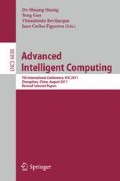Abstract
Learning to rank for information retrieval needs some domain experts to label the documents used in the training step. It is costly to label documents for different research areas. In this paper, we propose a novel method which can be used as a cross-domain adaptive model based on importance weighting, a common technique used for correcting the bias or discrepancy. Here we use “cross-domain” to mean that the input distribution is different in the training and testing phases. Firstly, we use Kullback-Leibler Importance Estimation Procedure (KLIEP), a typical method in importance weighing, to do importance estimation. Then we modify AdaRank so that it becomes a transductive model. Experiments on OHSUMED show that our method performs better than some other state-of-the-art methods.
Access this chapter
Tax calculation will be finalised at checkout
Purchases are for personal use only
Preview
Unable to display preview. Download preview PDF.
References
Joachims, T.: Optimizing Search Engine using Clickthrough Data. In: Proceedings of the ACM Conference on Knowledge, Discovery and Data Mining, Edmonton, Alberta, Canada, pp. 133–142 (2002)
Herbrich, R., Graepel, T., Obermayer, K.: Large margin rank boundaries for ordinal regression. In: Smola, A., Bartlett, P., Sch-lkopf, B., Schuurmans, D. (eds.) Advances in Large Margin Classifiers, pp. 115–132 (2000)
Freund, Y., Iyer, R., Schapire, R., Singer, Y.: An efficient boosting algorithm for combining preferences. Journal of Machine Learning Research 4, 933–969 (2003)
Xishuang, D., Xiaodong, C., Yi, G., Zhiming, X., Sheng, L.: An Overview of Learning to Rank for Information Retrieval. In: CSIE, vol. 03 (2009)
Sugiyama, M., Suzuki, T., Nakajima, S., Kashima, H., von Bnau, P., Kawanbe, M.: Direct importance estimation for covariate shift adaptation. Annals of the Institute of Statistical Mathematics 60(4), 699–746 (2008)
Shimodaira: Improving predictive inference under covariate shift by weighting the log-likelihood function. Journal of Statistical Planning and Inference 90(2), 227–244 (2000)
Xu, J., Li, H.: AdaRank: A boosting algorithm for information retrieval. In: SIGIR, Amsterdam, Netherlands, pp. 391–398 (2007)
Qin, T., Liu, T.Y., Tsai, M.F., Zhang, X.D., Li, H.: Learning to search web pages with query-level loss functions. Technical Report MSR-TR (2006)
Depin, C., Yan, X., Jun, Y., Gui, R.X., Gang, W., Zheng, C.: Knowledge transfer for cross domain learning to rank. Information Retrieval 13, 236–253 (2009)
Xiubo, G., Yan, T.L., Tao, Q., Andrew, A., Hang, L., Heung, Y.S.: Query dependent ranking using k-nearest neighbor. In: SIGIR, Singapore (2008)
Wei, G., Peng, C., Kam, F.W.,Aoying, Z.: Learning to rank only using training data from related domain. In: SIGIR, Geneva, Switzerland (2010)
Christopher, D.M., Prabhakar, R., Hinrich, S.: An Introduction to Information Retrieval. Cambridge University Press, Cambridge (2008)
Ping, L., Christopher, J.C.B., Qiang, W.: McRank: Learning to Rank Using Classification and Gradient Boosting. In: Proceedings of the International Conference on Advances in Neural Information Processing Systems, Vancouver, B.C., Canada (2007)
Robert, E.S., Yoram, S.: Improved boosting algorithms using confidence-rated predictions. Machine Learning 37(3), 297–336 (1999)
William, W.C.: Fast Effective Rule Induction. In: Proc. Twelfth Int’l. Conf. on Machine Learning, pp. 115–123. Morgan Kaufman, San Francisco (1995)
Kevin, D., Katrin, K.: Semi-supervised ranking for document retrieval. Computer Speech and Language 25, 261–281 (2011)
Jun, Xu., Yan, T.L. and Hang, L.: The OHSUMED Dataset in LETOR. Microsoft Research Asia (2007)
AdaRank on LETOR, http://research.microsoft.com/en-us/um/beijing/projects/letor/baselines/adarank.html
Author information
Authors and Affiliations
Editor information
Rights and permissions
Copyright information
© 2011 Springer-Verlag Berlin Heidelberg
About this paper
Cite this paper
Ren, S., Hou, Y., Zhang, P., Liang, X. (2011). Importance Weighted AdaRank. In: Huang, DS., Gan, Y., Bevilacqua, V., Figueroa, J.C. (eds) Advanced Intelligent Computing. ICIC 2011. Lecture Notes in Computer Science, vol 6838. Springer, Berlin, Heidelberg. https://doi.org/10.1007/978-3-642-24728-6_61
Download citation
DOI: https://doi.org/10.1007/978-3-642-24728-6_61
Publisher Name: Springer, Berlin, Heidelberg
Print ISBN: 978-3-642-24727-9
Online ISBN: 978-3-642-24728-6
eBook Packages: Computer ScienceComputer Science (R0)

